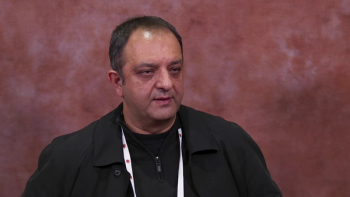
BCR-ABL1 transcript levels at time points within the first year of therapy for CML can best predict the achievement of a deep molecular response.

Your AI-Trained Oncology Knowledge Connection!


BCR-ABL1 transcript levels at time points within the first year of therapy for CML can best predict the achievement of a deep molecular response.

Acalabrutinib continues to yield high response rates in patients with relapsed/refractory chronic lymphocytic leukemia/small lymphocytic lymphoma.

Early disease progression for chronic lymphocytic leukemia was a robust prognostic factor for worse overall survival in patients treated with chemoimmunotherapy.

Venetoclax has durable clinical activity in patients with relapsed/refractory chronic lymphocytic leukemia whose disease progressed during or after ibrutinib therapy.

The novel agent ivosidenib is well tolerated and induces durable responses in patients with relapsed/refractory acute myeloid leukemia and other hematologic malignancies.

The FDA approved bosutinib (Bosulif) for use as a treatment of patients with newly diagnosed chronic-phase Philadelphia chromosome–positive chronic myeloid leukemia.

Next-generation sequencing could be a powerful and independent predictor for relapse and survival among adults with acute myeloid leukemia.

In this interview we discuss a study that examined the risk of acute myeloid leukemia in thyroid cancer patients who have been treated with surgery and radioiodine therapy vs those treated with surgery alone.

A combination of the FLT3 kinase inhibitor quizartinib with 5-azacitidine or low-dose cytarabine is active in patients with FLT3-ITD mutated myeloid leukemias, according to a new study.

Data presented at the 2017 ASH meeting showed that copanlisib resulted in an improved response rate and low rate of severe toxicities in patients with relapsed/refractory B-cell lymphomas.

A combination of ibrutinib plus standard chemoimmunotherapy induces deep responses in a relatively high-risk group of previously untreated, young chronic lymphocytic leukemia patients, according to a new study.

Adding rituximab to MBVP induction chemotherapy does not improve outcomes for patients with primary central nervous system lymphoma.

This video highlights a phase II trial that tested the addition of nivolumab to combination induction chemotherapy of cytarabine and idarubicin for patients with newly diagnosed acute myeloid leukemia.

A study presented at the 2017 ASH annual meeting showed that mogamulizumab resulted in significantly superior progression free survival and better outcomes compared with vorinostat in patients with previously treated CTCL.

A proof-of-concept study has demonstrated that resistance to treatment in multiple myeloma and mantle cell lymphoma could be linked to a protein called Nrf1, which appears to respond to proteasome insufficiency or pharmacological inhibition.

Adults with Philadelphia chromosome–negative B-cell acute lymphoblastic leukemia are very likely to achieve complete response with intensive combination induction chemotherapy, according to a retrospective review presented at the ASH Annual Meeting.

Data presented at the 2017 ASH annual meeting revealed that the combination of selinexor and sorafenib appears to be safe with clinical activity in patients with relapsed/refractory FLT3-mutated acute myeloid leukemia.

A potentially practice-changing study presented at 2017 ASH shows high rates of sustained complete response in patients with relapsed/refractory diffuse large B-cell lymphoma who were treated with CTL019 CAR T-cell therapy.

Data presented at 2017 ASH showed that mogamulizumab resulted in improved progression free survival (PFS), overall response rates (ORR), and better quality of life in patients with previously treated CTCL compared with vorinostat.

About one-third of patients with previously treated chronic lymphocytic leukemia (CLL) were minimal residual disease negative after 6 months of treatment with the combination of targeted agents ibrutinib and venetoclax, according to the results of the TAP CLARITY study.

Although a longer progression-free survival is of high importance to CLL patients, a reduced risk of serious adverse events might be worth a tradeoff for some efficacy.

In this interview ahead of the ASH Annual Meeting we discuss the current management of Philadelphia chromosome–positive acute lymphoblastic leukemia and the role of stem cell transplantation.

Researchers found that high levels of IDO (indoleamine 2, 3 dioxygenase) at diagnosis of AML could also identify those who might benefit most by taking an IDO inhibitor along with their standard therapy.

A new study has found that inhibiting the METTL3 gene destroys human and mouse acute myeloid leukemia cells without harming non-leukemic blood cells, thereby making it a potential target for new therapies.

Use of two BEACOPP regimens that incorporated brentuximab resulted in improved rates of complete response and complete remission at the end of treatment.